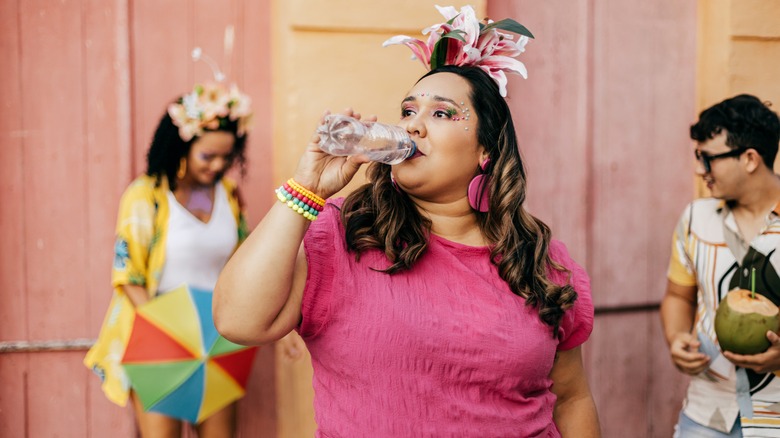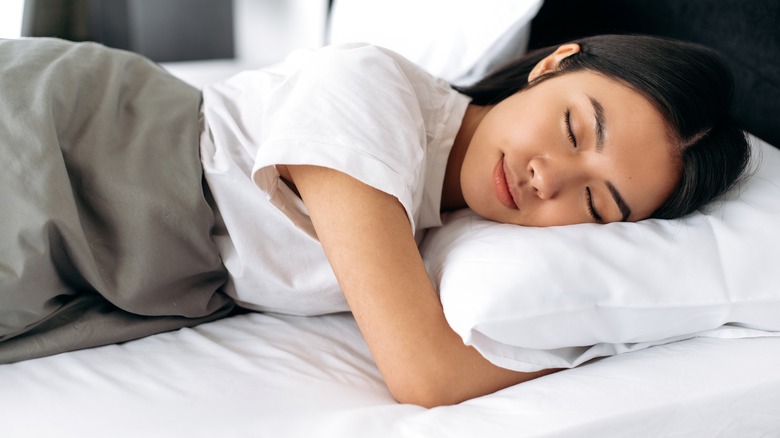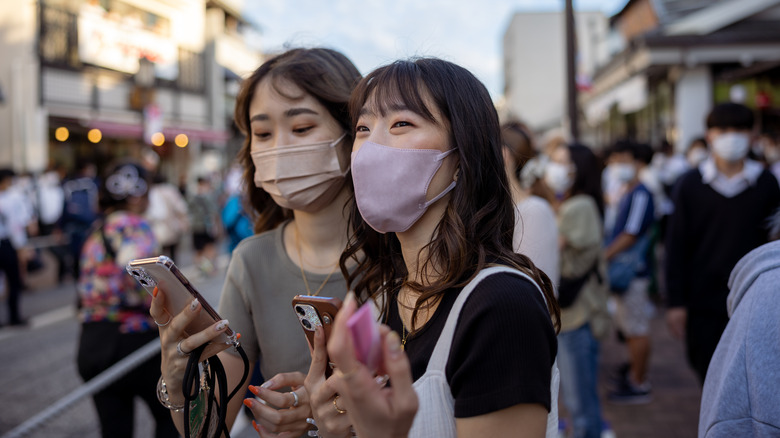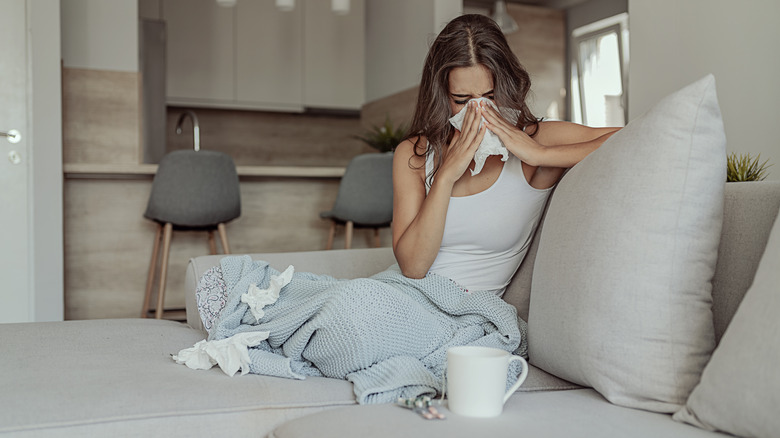Concert And Festival Season Is Here And We're Showing You How To Avoid A Fest Flu
Pitchfork and Newport Folk are slated to take place in July; Lollapalooza, Outside Lands, and Wonderbus are all plotted in August, and Electric Zoo is set to happen on Labor Day weekend. That's right, the next few months are packed with music festivals, officially marking #festivalszn. Is your flower crown ready yet?
People have been congregating for their shared love of music since time immemorial, but the tradeoff of attending one is you're also simultaneously risking yourself to contracting a slew of diseases. A study published on Euro Surveill found that large-scale, open-air events are pretty much fertile ground for viral diseases, including, but not limited to salmonella, hepatitis A, measles, mumps, and influenza, aka the flu. And even though the flu season is over and done with once festival season reaches its fever pitch, you still cannot rely on your immunity to shield you from it — or at least something like it. Terms like "Coachella cough" and "festival flu" exist for a reason. "It's [festival flu] usually not a specific illness but a combination of lack of sleep, lack of nutrition, screaming, shouting, and dehydration," said Cedric "Jamie" Rutland, M.D., a pulmonary and critical care medicine physician of the American Lung Association explained.
If you will be attending a festival soon, or at least a public event with thousands of attendees, the responsible thing to do is to take safety precautions to avoid contracting the so-called festival flu. After all, you don't want to spoil the experience by spending the weeks post-festival in bed with a box of tissues.
Hydrate, hydrate, and hydrate some more
When you're squeezing your way to a barricade and then dancing your heart out and hanging with your friends in between, it can be easy to forget about, well, everything. But if you're going to do only one thing for yourself at a festival, it should be to make sure that you're well-hydrated. When you have enough H20 in your body, the better you can withstand the hot weather, and the less likely you'll suffer from cramps, headaches, and dry mouth. The American Lung Association notes that hydration also retains the moisture in your nose and throat area, which makes mucus easier to expel.
"Staying hydrated is one of the easiest ways to not only stay safe, but also keep your body in motion all weekend long," Skip Blankley, founder of Festival Survival Guide, told HuffPost. "Hydration is not just about water, but electrolytes as well. Being outside in the heat and dancing all weekend long means your body sweating out all of those essential minerals you need to function at your best."
Aside from your wallet, power bank, and earplugs, don't forget to carry around a water bottle with you at a festival. This way, you can simply top it up at the dispensers scattered across the area, so you can keep yourself hydrated all festival long. And if you can avoid it, refrain from chugging alcohol and caffeine as they're notorious diuretics.
Sleep well and eat well
Since you're most likely wired from excitement throughout the festival, the last thing you want is to get some sufficient shuteye instead of attending parties and partaking in as many activities as possible. But here's the thing about your immune system: it gets much weaker when you're sleep-deprived. Plus, sleep deprivation can also severely dampen your mood, and you don't want to be the cranky one in the group who sours everyone's vibe.
"Having adequate sleep is a good habit for optimal immune system functioning and to prevent respiratory viruses like the flu," Dr. Amesh Adalja, an infectious disease specialist, told Cosmopolitan. Seven to nine hours of rest is ideal for a good night's sleep, but if you can't swing it, try to get at least six hours.
Don't forget to keep your tummy happy, too. Keeping yourself fed can also help you ward off diseases, especially if you're loading up on mineral-rich food. Today notes that foods like oranges, yogurt, tomatoes, wild salmon, egg, and whole-grain bread can help beef up your immunity, so if you can, try to consume those foods if available.
Mask up and sanitize regularly
Even though COVID-19 restrictions have already eased up for over a year, wearing a mask is still one of the best ways to protect yourself from all the dust, smoke, and allergens that are ever-present in festivals, as well as dodge flu and COVID-19, of course. Granted, viruses aren't as easy to spread in outdoor areas compared to cramped spaces, but since you'll also be interacting with different people, you're still at risk of contracting something.
To err on the side of caution, masks could help, especially if you are immunocompromised. "There's probably a risk of transmission from the people who are right next to you, who you might be talking with, or where your face might be just a couple of feet away from someone else," Dr. David Dowdy, an infectious disease epidemiologist at the Johns Hopkins Bloomberg School of Public Health, shared with Verywell Health.
Additionally, if you've developed a frequent sanitation habit over the pandemic, you may want to keep it up when you're at a festival. The Centers for Disease Control and Prevention recommends washing your hands with soap and water, but given how bathrooms are sparse and crowded at festivals, a great alternative is a hand sanitizer with 60% alcohol at the minimum.
Load up on vitamins and supplements
If you don't think that your diet can sufficiently boost your immunity from diseases, you can augment it by loading up on vitamins and supplements. But instead of popping a multivitamin at the festival itself, make sure that you take them days or weeks before so you can actually benefit from their effects. "You can feel the benefits of [a proper supplement routine] as early as days vs. weeks," Dr. Amy Lee, the Head of Nutrition at Nucific, previously told Women.com. "But you have to accept that bioavailability is also dependent on one's baseline in absorption, and health."
Just think of taking vitamins as a pre-game ritual for festivals. If you want to be in tip-top shape, up your vitamin game at least a few weeks prior. They won't offer 100% immunity, but at least they'll help keep you healthy and energized. Dr. Heather Moday, a board-certified allergist, immunologist, and functional medicine physician, told CNBC that at the very least, you should load up on the following vitamins: vitamin C, vitamin D, zinc, and curcumin.
What to do if you feel like you're coming down with the flu
You know you're down with something bad if your nose starts getting stuffy, your fatigue feels deeper than post-festival exhaustion, your muscles are achy, and you feel warmer than usual. If you have these symptoms even after taking precautions, it's not the end of the world. You can still kick the flu's butt at home by doing pretty much everything listed above.
Make sure that you drink plenty of fluids and get lots of rest, eat healthy meals, and drink over-the-counter medications to ease your symptoms. If they don't get better even after a few days of self-medication, then it's a sign that you should see a doctor just to see if there's anything else going on.
And once you've fully recovered, make it a point to get a flu vaccine, too, instead of delaying it once more. Remember, viruses are everywhere, and not just contained in festivals. It's always best to pull all the stops to protect yourself. "A vaccine deferred is often a vaccine not received," Dr. William Schaffner, a professor of infectious disease at Vanderbilt University, told NPR. "You have to have the discipline to be sure that you do get vaccinated."





